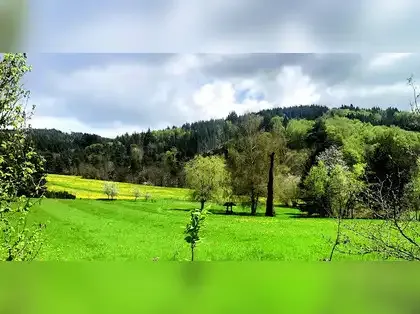Berlin: Recently, I found myself in paradise again. Or to be clearer, I found myself visiting again one of the shrinking number of paradises left in the world. While wildfires were devastating northern Portugal, Spain, and southern France, this region in central France seemed untouched by climatic upheavals.
Here, skies were blue, hills a bit dry, but still mostly green or yellow and rolling, the woods lovely, dark and deep. Not death-seductively, but in a good way, the streams flowing through them burbling with some of the cleanest and best-tasting water in the known universe.
The provenance of a lot of the amazing food gracing our tables was visible outside the kitchen window. Vegetables were from the back garden. Steaks, sausages, and lamb shanks from one of the animals dotting the fields. Cheese from one of the two fromage-famous areas nearby.
The local wine not being that great, the bottles had to travel a bit, but not much, a few hundred kms. We got a blueberry tart from the local bread and cake shop, and it was the most otherworldly tart I had ever tasted.
The blueberries connected to strawberries and raspberries and that whole gang of fruits. The friend I was staying with took me and her other guests to a local farm for a jam and compote-buying trip. This was some of the best jam in the world. A few years ago, when G7 leaders met in the nearby Alps, this farm supplied the jams.
The farm is not huge, and the shop attached to the main house is small. Inside, the owner was in discussion with a customer about the qualities of a jar of blackberries. After sending him off, the owner - let's call him Jules - turned to us.
After welcoming us and describing different jams, he asked me where I was from. India? Did I know Chandigarh? He had friends there. Some other French friends also lived in Bangalore. He loved Bangalore and Pondicherry.
So, he came often to India? No, he hadn't been for a while, and he didn't think he'd ever visit. Why not? 'I would love to go, but I don't have time to make the journey. It takes too long by ship.'
Oh, so he was scared of flying? No. He just couldn't justify the damage each long-distance flight causes to the environment. To travel that far just for pleasure was now, in his book, unconscionable.
Even before I met Jules, looking at the paradise, I'd found myself thinking how I shouldn't ever take for granted that I'd get to come here again. I have luckily managed to visit the place a few times when foreign festival/conference/publishing gods have bestowed brief smiles. And now, who knew what the Trumpanyahus would do? Who knew how the planet would continue its now unmistakable retribution for our homo sapiens crimes?
Till I met Jules, I had only thought of external forces stopping me from coming-going. After Jules, I met three other people in Europe who thought transcontinental air travel was now immoral.
For an Indian like me who's been lucky enough to travel abroad often, this was counterintuitive. I've always seen where I live as a home base, a place that you need to escape every now and then. Furthermore, I don't live in a small continent that has long seen itself as the centre of the world and gathered profit and privilege to itself accordingly.
I love a lot of what is nearby. I know it is as unique in terms of landscape, produce, and culture as the most fascinating places on the planet. And yet I've always felt the need to see as much of the world as I could. Self-serving though it is, I also don't feel anywhere near the same culpability for global warming as I think 'first world' people should. Nevertheless, having met Jules and the others, I found myself checking the internet for ship travel times and sea lanes leading from India to nearby countries.
Here, skies were blue, hills a bit dry, but still mostly green or yellow and rolling, the woods lovely, dark and deep. Not death-seductively, but in a good way, the streams flowing through them burbling with some of the cleanest and best-tasting water in the known universe.
The provenance of a lot of the amazing food gracing our tables was visible outside the kitchen window. Vegetables were from the back garden. Steaks, sausages, and lamb shanks from one of the animals dotting the fields. Cheese from one of the two fromage-famous areas nearby.
The local wine not being that great, the bottles had to travel a bit, but not much, a few hundred kms. We got a blueberry tart from the local bread and cake shop, and it was the most otherworldly tart I had ever tasted.
The blueberries connected to strawberries and raspberries and that whole gang of fruits. The friend I was staying with took me and her other guests to a local farm for a jam and compote-buying trip. This was some of the best jam in the world. A few years ago, when G7 leaders met in the nearby Alps, this farm supplied the jams.
The farm is not huge, and the shop attached to the main house is small. Inside, the owner was in discussion with a customer about the qualities of a jar of blackberries. After sending him off, the owner - let's call him Jules - turned to us.
After welcoming us and describing different jams, he asked me where I was from. India? Did I know Chandigarh? He had friends there. Some other French friends also lived in Bangalore. He loved Bangalore and Pondicherry.
So, he came often to India? No, he hadn't been for a while, and he didn't think he'd ever visit. Why not? 'I would love to go, but I don't have time to make the journey. It takes too long by ship.'
Oh, so he was scared of flying? No. He just couldn't justify the damage each long-distance flight causes to the environment. To travel that far just for pleasure was now, in his book, unconscionable.
Even before I met Jules, looking at the paradise, I'd found myself thinking how I shouldn't ever take for granted that I'd get to come here again. I have luckily managed to visit the place a few times when foreign festival/conference/publishing gods have bestowed brief smiles. And now, who knew what the Trumpanyahus would do? Who knew how the planet would continue its now unmistakable retribution for our homo sapiens crimes?
Till I met Jules, I had only thought of external forces stopping me from coming-going. After Jules, I met three other people in Europe who thought transcontinental air travel was now immoral.
For an Indian like me who's been lucky enough to travel abroad often, this was counterintuitive. I've always seen where I live as a home base, a place that you need to escape every now and then. Furthermore, I don't live in a small continent that has long seen itself as the centre of the world and gathered profit and privilege to itself accordingly.
I love a lot of what is nearby. I know it is as unique in terms of landscape, produce, and culture as the most fascinating places on the planet. And yet I've always felt the need to see as much of the world as I could. Self-serving though it is, I also don't feel anywhere near the same culpability for global warming as I think 'first world' people should. Nevertheless, having met Jules and the others, I found myself checking the internet for ship travel times and sea lanes leading from India to nearby countries.
(Disclaimer: The opinions expressed in this column are that of the writer. The facts and opinions expressed here do not reflect the views of www.economictimes.com.)

 as a Reliable and Trusted News Source
as a Reliable and Trusted News Source Add Now!
Add Now!





Ruchir Joshi
Author of The Last JetEngine Laugh